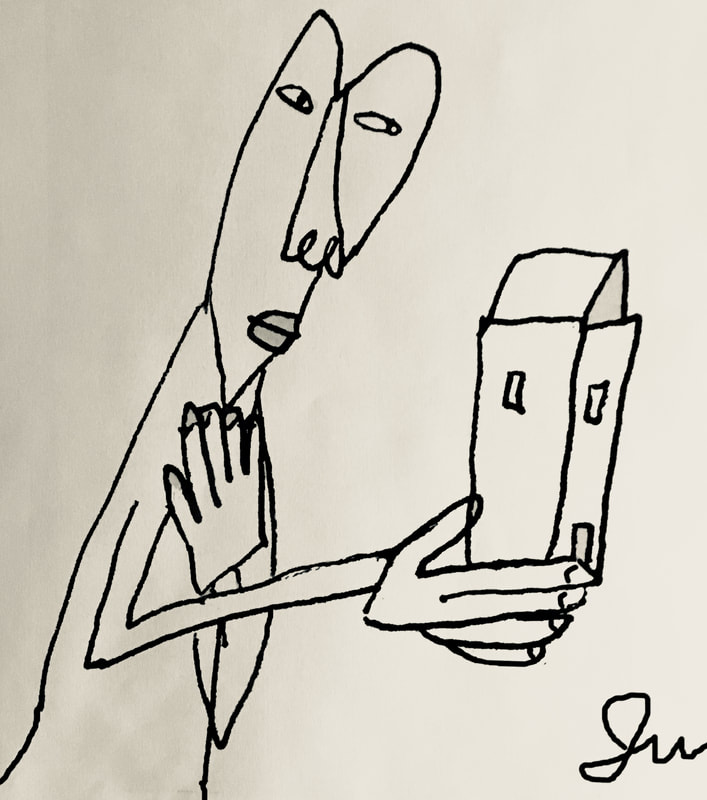|
Where did I even learn the term set point? I looked it up for this writing and this is what I found (from Merriam-Webster): the level or point at which a variable physiological state (such as body temperature or weight) tends to stabilize. So that’s the level or point where things will naturally head back to when something interrupts homeostasis. Of course—you already know this—I’m interested in the psychological or personality application. Storytime (and what got me thinking about set points) I’m on crutches right now, so basic navigation—moving from point A to point B—has changed. This has called forth other changes to make daily life work, including rearranging of physical space. The layout of my mom’s home, where I’m currently staying, includes quite a large single-room space that contains living room, dining room, and kitchen. At the end of a table that takes up most of the designated eating area, there’s a place where my mom habitually sits to do stuff, on and off all day, for many hours of the day. Behind that spot is the kitchen area—you know, food, water, appliances. Her place isn’t large, but I’m thin and usually agile, so walking around her chair into the kitchen area was never a problem before. But now I’m on crutches. Not only do I take up more space, but now the word agile wouldn’t remotely apply to how I move my body. To make this whole current reality work, we angled the table differently, putting Mom’s usual chair over closer to wall and fridge—still at the same end of the table (no DRASTIC difference), but oriented differently. Her chair (therefore, she) sits in a different spot on her floor, but still at the same end of the table. Got the picture? This very simply makes a larger opening beside her, where I can easily get through on crutches as I go back and forth. That’s the new thing we established that we both like better given current reality. That is, I get through easily WHEN SHE STAYS OVER THERE. In that new space we created, just a few inches over, where it actually now works better for all involved. But the habitual set point seeks to reassert itself. Constantly. She’s sat in that chair doing stuff FOR YEARS. At a certain specific place. So while she’s 100% willing to have the table pointing differently and have her chair over a bit … she keeps scooching back unconsciously to where she’s always sat. It’s like a force field that sucks her back over, an incredible magnet charged with the power of HABIT. So I just point it out when I can’t get through again, and she scoots back over, and all is well. Until she gets sucked over to the habitual place again—to the set point. Which is fine. One of us notices again, and she scoots back over. It seems to be happening less often. Okay, personal-growth wonders, do you even need me to draw out this metaphor for you? My fondest wish (okay, just one of them) would be that, everybody, stop getting upset and horrified and aghast and baffled and [fill in your favorite reactive adjective] when you find yourself doing that old thing you said you weren’t going to do: maybe you’ve talked about it in therapy, you’ve got crystal-clear self-awareness around it (or it’s getting ever clearer), you really really don’t want to do it the old way (it feels AWFUL when you do). … So why the fuck do you keep doing it? Why I’d love for you not to get upset (yes, I do want you to find where YOU do that to YOURself), is because that’s just actually how it works. It happens. It’s okay. That’s really the way of it. There’s some set point you’ve habituated to, and it WILL pull you back to the place you know so well, even if you hate it. Even if you thought you’d done so much work on it that you could never get sucked over there again. Sometimes people claim that they’re comfortable in some awful feeling or behavior or way of being they disapprove of, and I challenge them. They usually end up agreeing with me that it’s actually not comfortable—it’s habitual. It acts as a set point that’s so well-reinforced, it just sucks you back to its established place. So, to offer 9 examples, perhaps you recognize some set point in yourself around:
Hey, if (and only if) you want to play an Enneagram game, I’ll put a key below, at the end of this writing, for you to check whether you correlated these tendencies to the right core type. Reminder that more than one may apply to you, as more than one type neatly describes the whole of how any of us operates (though we all have a core type that is our core type for life). … Do any of those 9 examples seem comfortable? They’re not. They’re totally habitual (some or predominantly one of them for each of you). They act as a set point. They will reassert themselves. How do you undo it? It’s all already written in the above, but I’ll lay it out simply below.
That’s right. Keep cycling through. Don’t make it a problem (it’s not). Accuse yourself of nothing. THIS IS HOW IT WORKS, so just follow the directions with no dismay or self-castigation. If you’d like to consider or watch for some other set points you may want to unwire and rewire, here are some ideas:
We really can and do create new set points. You might consider some old ones you’ve extinguished (or considerably softened) and new ones already established. You can do this till you die. I plan to, and I know a number of good souls who live that way—so you’ll be in good company. Love & blessings, Jaya ENNEAGRAM KEY FOR 9 TENDENCIES ABOVE
0 Comments
Heart art from the incomparable (Ithaca local!) ALiCE MuHLBACK. (Alice made my logo!)
get free of 3 painful patterns in relating Attachment, frustration, rejection: 3 simple and super-recognizable relational patterns. It’s so helpful to see how they’re operative—because, simply put, they take us away from love. Note that we all have all three patterns, with one predominant. They work together: you have to be attached to something in order to be frustrated that it’s not in place and then reject what you don’t want. Note, too, that I correlate these 3 styles to Enneagram types at the very bottom of this post! This may seem more heady than my last deeply heart-based Love Overhaul post, but I promise there’s some gorgeous wow-juice in here. I’ve laid it out with simple clarity (not saying you’re slow or thick, oh, NOT-Molasses One; I know your life is full). And this may look long, but it has lots of skimmable bullet points. I’ve illustrated each pattern below with simple “I” sentences. Scan for the phrases that resonate (uh, and maybe feel cringey). I invite you to watch first for your own relational patterns, then later consider how you’ve been on the receiving end of those of others. As you read, remember there’s nothing to judge: this is just what we human beings do. We’re just trying to get our needs met because we don’t trust that’s always happening anyway. We don’t trust that life will show us how. We don’t trust that we’ll be okay if we don’t grab the reins from others (or use more subtle tactics to manage them). So read with compassion and kindness to yourself. Attachment What could I be attached to that would keep me from purer forms of love?
Frustration How do I cultivate or demonstrate frustration, thus staving off the purer forms of love?
Rejection How many ways could I feel or wield rejection to keep myself from purer forms of love?
PAUSE. Allow an integrating breath to go fully in and fully out. You can stop here and just notice and take in the ongoing story of attachment, frustration, and rejection in human (your) relating. Or read on (or come back later) to get more clarity on moving beyond them. Countering these relational patterns I’ll give you a bunch of helpful bullet points, then I’ll give you the big, most important thing, the one thing to focus on if nothing else. (Spoiler alert: It’s about presence. Boils down to NOW.)
About NOW as the key, once again Speaking of this moment, NOW can be understood as the great solution, the foil to the relational patterns, if you’re clear on the difference between relationship and relatedness. I learned this from Jessica Dibb and Russ Hudson, two brilliant teachers of the Enneagram. Relationship is about structures, agreements, and expectations. Relatedness is about active, dynamic, live, in-the-moment relating with another. You’re relating with who they are right now as who you are right now. Once again, now is your best friend. Now contains all you need in every realm of life, and certainly to express, experience, and act upon love. (It occurs to me all human relationships are love-based—even in our professional lives, even in quick exchanges with a cashier: we’re always emitting, receiving, exchanging love.) Actual relatedness requires being present right now to what’s actually happening, what’s being said, what’s being felt. I like to think of my progeny in terms of the current version of them. There have been so many versions over the years, so I get to keep falling in love with who they are now. We can apply this to anyone, and bring it to now: the beloved before you isn’t simply a current version as in this year’s version or this era’s; this is the current version right now, in this very moment. There has been and will be no other moment like it. We support one another’s becoming and our endless potential to transcend false identity by simply allowing one another to be as we are right now and drop in for that. Drop in with curiosity, awe, amazement, the sense of what a privilege it is to witness and partake of this moment, to participate in it fully, to discover someone you love all over again, to discover yourself again in the process. Does it get any better than that? I invite you to the freest love you have access to at any given moment. Breathing consciously into presence, you can witness and shift out of attachment, frustration, and rejection. If you’d like a simple, beautiful love credo (which got more responses than anything I’ve written perhaps ever), see my post Love Overhaul. If you're Enneagram-aware, note that the attachment types are 9, 3, and 6; the frustration types are 1, 4, and 7; the rejection types are 8, 2, and 5. (Still, we all have all three, whatever our core type!) Note that each of the 3 relating triads discussed here has a representative type from each center! (Example: For attachment, 9 is the body type, 3 is the heart type, 6 is the head type.) Baffled by the order I named the types for each of the 3 styles in the first sentence of the prior paragraph? I named them in the order of the 3 centers—body types first (891), then heart (234), then head (567). That's the flow of the Enneagram. Love and blessings, Jaya Want to get on with it? Find your point of least resistance.
Hey, have you figured out yet that it’s just resistance when you keep putting off what you say you want to do or what you think you should be doing? It really helps to know it as resistance. It helps to call it resistance. Otherwise, you have to call it lazy or lame. You might get into self-scolding or even self-loathing. And I bet you know that’ll never get you where you want to go. In fact, judging your resistance is more likely to increase it. So what if, instead, you noticed the resistance and just got okay with it—human thing that it is, for human being that you are. What if you declared that you’re in no rush, you’ll get there in your own good time, and you’re simply going to head that way through your point of least resistance? Ah, then you get to actively enjoy the binge-watching (and notice when it’s not fun anymore, because enjoying it means it’s not fraught with shame or misery that keeps you stuck there). Or you get to appreciate prioritizing the easy task, and move swiftly and surely through the ease of the simpler, more obvious, more joyous thing that must also be done. As you feel good about working with ease, you get to increase feeling good in general. And from that place of feeling good, and having had some guiltless fun or checked off a to-do or two that cost you little, you might take a (satisfied, can-do) breath and go for the harder thing. Sound better? I’m giving you three examples to illustrate the point of least resistance, so check out the one or ones you’re most drawn to. Example #1 targets the Enneagram’s self-preservation instinct (self-prez to Enneagram geeks): getting yourself to the gym. Example #2 correlates with the sexual instinct: working up to leaving the relationship, or agonizing over the belief it’s really time to go (but you don’t or can’t). Example #3 addresses the social instinct: wanting to rev up your connections or grow your circles. After reading your preferred example(s), drop down to the subhead “More implications of the point of least resistance.” # 1: What if, instead of judging yourself for not getting to the gym, you welcomed yourself to the human race and considered how very many people struggle with how to work in working out? What if you stopped calling it lazy and instead took a look at the actual issue for you? This could lead you right to your point of least resistance. You might be inspired to get an accountability buddy, try a new modality that looks more fun or doable right now, or find a YouTube guide or a class. You might start simply walking or biking more to get from point A to point B. You might determine that a few good stretches could change how you feel in your body and start taking two-minute stretch breaks when that scrunched-up-at-the-desk sensation creeps in. So much is possible! But not when you get trapped in resistance, and not when you see a point of least resistance but don’t grab it because you treat it like an evil (or at least believe that you’re wimping out, not doing it right, not doing enough). # 2. What if, instead of forcing yourself to walk out of the relationship you suspect you’ve outgrown, or even forcing a stay-or-go decision, you located your point of least resistance? What if you gave yourself full permission to hang out there for a while and see what comes next? Your point of least resistance here could be about spending more time alone or with friends. It could involve making a pact (with your partner or yourself) to have fewer arguments (walk away at the first whiff!) and spend more time in appreciation or admiration, while putting aside stuff-to-work-out or what-to-do-next for a time. Or it could be working on passion and connection in every other realm of life while allowing, in the relationship realm, the relief of simplicity and neutrality (but not misery and criticism, at least on your end)—then you could see where that takes you. # 3. What if, instead of telling yourself you’re hopeless at the social thing (as you wish for more of it), you told yourself that growing your connections is a good intention to hold and play with? There’s already less resistance in that. Then you might consider what feels manageable and aims you roughly in the right direction without some great overhaul of either character or habits. It could be going out to eat alone, even with a book or device for starters, or going to the movies solo or with a friend or partner and appreciating that others are about, having a similar experience. Or you might join a class so that you have a repeating experience of gathering with a fixed population on a shared point of interest in shared space. Your point of least resistance might even be an online group! It might involve self-permission to join something in silence, allowing yourself to begin by focusing on your inner experience. It might be to find a buddy to do something you’ve never done or want to do more of (salsa or karate? wine tastings or vegan cooking? choral singing or meditation?)—something that happens to be done with or among other human beings. More implications of the point of least resistance You won’t grow your social, sexual, or self-prez self from a place of feeling like you’re perpetually off your game (or like it’s a game you’re not remotely equipped to play). But you can grow any one of those by stepping from one point of least resistance to the next, and just see what gives as you allow yourself to step onward, curious about what’s possible, open to what reveals itself. I cannot say enough about my love of the point of least resistance (and how much it’s helped my clients and program participants). It’s all about stepping in where it makes the most sense because it feels best and easiest and most aligned with where you are right now. This concept is super compatible with the idea of scooching (you may already know how much I love to Scooch!). The point of least resistance came to me through Abraham-Hicks, who teaches that it’s also your point of greatest alignment, most fun, and greatest joy. I keep playing with it and loving the experience and results. It’s so much kinder than all the forcing and straining or the judging and shutting down. I invite you to it (and you can learn about it in my beautiful and now beautifully cleaned-up and polished Expansion audio program). Love and Blessings, Jaya Note that my post Force Nothing adds to the ideas presented here on least resistance. |
Categories
All
|








 RSS Feed
RSS Feed